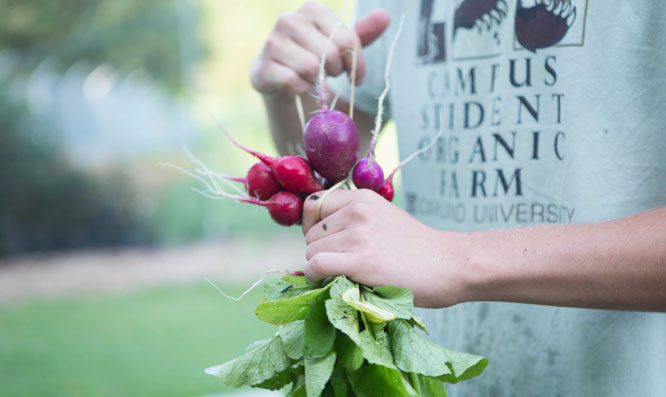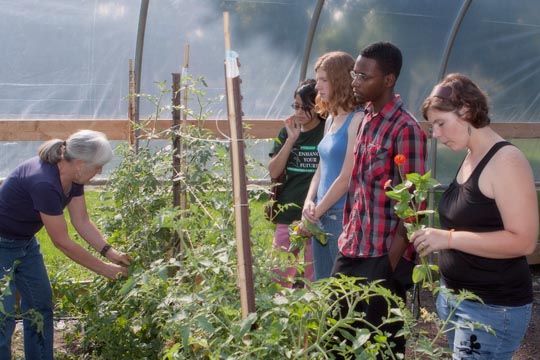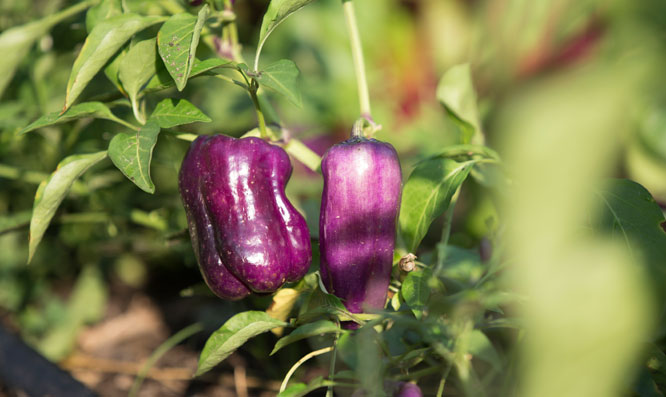While most people begin the day with a cup of coffee and a perusal of their e-mail account, Jared Hanna spends his morning surveying the fruits – and vegetables – of his labors.
“Every morning I like to go on farm walks and take a look around,” said Hanna, Oakland University alumnus and farm manager at the campus organic farm. “I like to get a feel for the place, and a fresh feeling of context for the day.”
Hanna is not alone in the sentiment. Various members of the Student Organic Farm Program (SOFP) usually join in his morning walks, learning the skills involved in gardening and sustainable living.
SOFP was initially created as an OU student club in 2008, but has since evolved into a multi-faceted, wide-reaching operation that supports the community, provides academic instruction, and teaches students the methods of organic gardening in an urban or suburban environment.
Rediscovering a connection to food is a topic that has taken off in recent years, according to Fay Hansen, associate professor of biological sciences and SOFP advisor.
“Communities are coming together to re-claim a connection to the food system and to find alternative ways to obtain healthy choices and sufficient fresh produce for all,” she explained.
“Schools and college campuses are among the leaders in this movement, which has gone beyond the realm of agronomy to an interdisciplinary effort. SOFP is in a strong position to be a community leader and a resource for the provision of trainees who can make a difference in community food production and also education about food, health, and sustainability.”
The farm has roots as old as the university itself. The first classes taught at the university – back when Oakland was known as Michigan State University – Oakland – were held in converted chicken coop now used for SOFP storage.
The organic farm reaches into the classroom and across the community. Topics such as ecology, botany, entomology, microbiology, chemistry and even anthropology are regularly part of classes held at the farm, and a SOFP partnership with students from the Baldwin Center in Pontiac and donations to soup kitchens helps meet a need for fresh produce in underserved urban communities.
This spring, the farm received a boost from the Consumer’s Energy Foundation in the form of a $5,000 grant to support operations and expansion efforts, and the club was named OU’s Outstanding Social Program by the Center for Student Activities.
Throughout the summer and fall months, OU’s farmers sell their produce to the campus community, in weekly fall stands held from 10 a.m. to 3 p.m. every Thursday, between the Oakland Center and Kresge Library. Students will sell organic produce such as kale, collards, eggplant, tomatoes, summer squash, zucchini and scallions.
OU farmers are now looking forward to the next stage of production: raising money to build a Hoop House. Once built, the Hoop House – a solar heated structure for year-round farming – will allow SOFP to extend their growing schedule an additional three to four months.
“With the Hoop House, we will be able to grow produce year round, host more academic courses, and have a greater capacity for serving our community,” Hanna explained.
To reach this goal, SOFP plans to launch a crowd-funding campaign. The campaign will run from Thursday, Sept. 19, through Saturday, Sept. 21. Show support and help SOFP grow by participating through Facebook at
facebook.com/StudentOrganicFarmersatOU.
To learn more about Student Organic Farm Program activities, meetings and membership,
visit the Facebook page. Students can also connect on Twitter at
@OUFarmers.



